Andrew Yang: Presidential Candidate & Crypto Proponent
Those words were uttered during the Democratic Party’s 2020 national convention by one of the more intriguing figures to have campaigned for the presidential nomination. Andrew Yang may have dropped out after the New Hampshire primary, but you can expect to hear a lot more from him in the future.
Yang’s views on many of the problems facing America and how they might be solved set him apart from other politicians on both sides of the political divide. He has a modern, innovative stance on many of the issues that are shaping the political landscape in America and elsewhere.
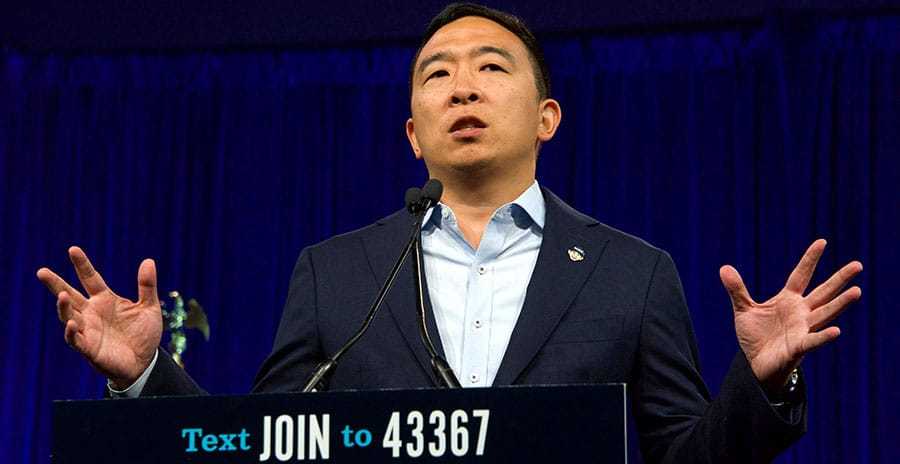
But before you write him off as the sort of progressive Democrat that gets right-leaning Americans reaching for their assault rifles, consider this from Tucker Carlson, said during a March 2019 Fox News interview: ‘I sit with my jaw open, I agree with you so much.’
Not the sort of thing you’d expect to hear Tucker Carlson say to a Democrat presidential candidate. While this was in response to Yang’s views on automation and the future of work in America, there are other reasons why the 45-year-old should be on your radar.
He’s one of the few political figure out there with clear and coherent views on cryptocurrency who promised to throw ‘a party in the White House for the entire crypto community’ if he won the presidency. His campaign attracted impressive levels of grassroots funding, while his supporters (the ‘Yang Gang’) exhibit the same sort of fervour that Bernie Sanders has managed to inspire.
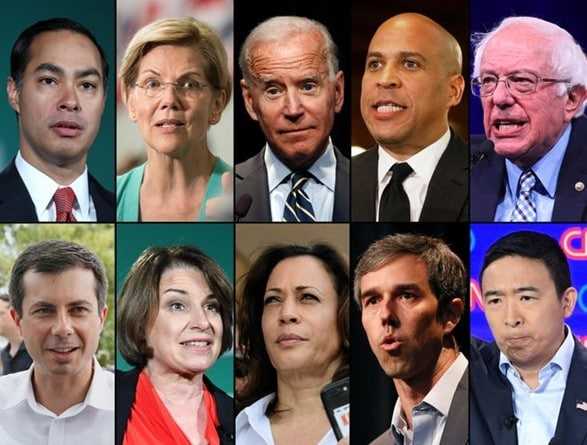 The Democratic Party’s presidential candidates in 2020. Clockwise from top left: Julian Castro, Elizabeth Warren, Joe Biden, Cory Booker, Bernie Sanders, Andrew Yang, Beto O’Rourke, Kamala Harris, Amy Klobuchar, Pete Buttigeg.
The Democratic Party’s presidential candidates in 2020. Clockwise from top left: Julian Castro, Elizabeth Warren, Joe Biden, Cory Booker, Bernie Sanders, Andrew Yang, Beto O’Rourke, Kamala Harris, Amy Klobuchar, Pete Buttigeg.
While other, better-known candidates may have hogged the limelight during the race for the Democrat nomination, many consider Yang to be the one pointing the way forward for the party beyond Joe Biden’s presidency. But before we look at him in more detail, let’s take a moment to consider the state America now finds itself in and the challenges it needs to address.
The State of the Union
Joe Biden may have won the presidential election (despite what the Trump campaign continues to say) but America remains deeply divided. Biden’s 306 electoral college votes and six million-plus lead in the popular vote may look decisive, but Trump and what he stands for isn’t going to fade away. The issues that shoved him into the White House in 2016 remain unresolved.
The fact is that record numbers of Americans voted for Trump this time around and he would almost certainly have been given another term if Covid-19 hadn’t pitched up and flipped the script. Unless the Democrats can prevail in the Georgia run-off election in January, then the Republicans will retain control of the Senate and do their best to thwart Biden at every turn. Things are likely to get worse before they get better.

It's easy to dismiss Trump and his supporters as the manifestation of the ultra-conservative, reactionary and bigoted side of America. Any number of his policies and pronouncements can be brought up to reinforce this view: his anti-immigrant stance and promise to ‘build the wall’; his refusal to condemn white supremacists in Charlottesville and elsewhere; his clear disdain for almost the entire Washington political establishment. The list goes on and on.
But perhaps the main reason for Trump’s continued popularity is his unwavering determination to bring back jobs and prosperity to the countless corners of America from which both have disappeared. Millions of Americans still support him because they see him as their saviour from economic ruin and their best shot and being able to lead useful, fulfilling lives. This does not make them bad people. They want the same things as the rest of us do.
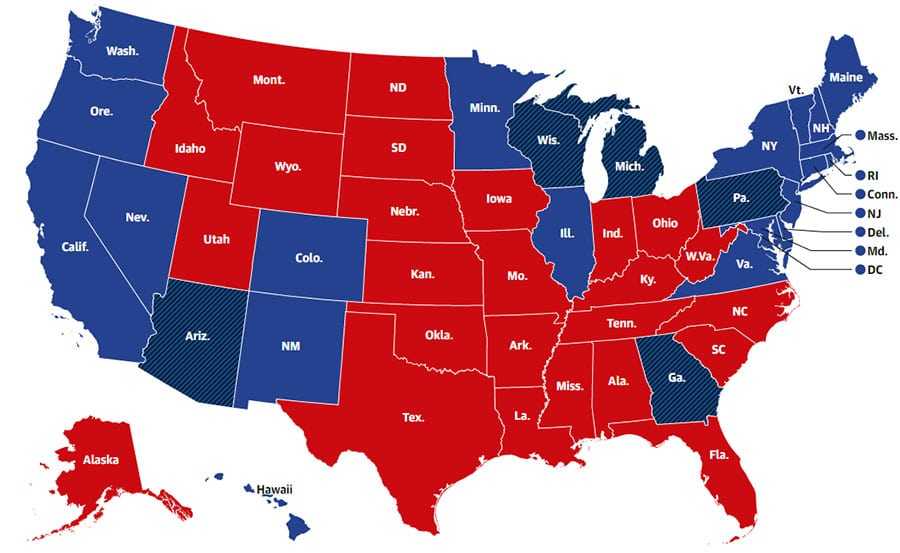
If Joe Biden or any future Democratic candidate wants to win in Ohio, Indiana, Kentucky or Iowa, then they will need to offer answers to the hollowing out of American manufacturing and the continued declines in employment and living standards that come with it. Technology may be changing the way we live and work and making a few people wealthy almost beyond belief, but others are picking up the bill.
Automatic for the People
Andrew Yang made a bold claim during one of the Democrat presidential debates, saying that automation ‘is why Donald Trump is our president today.’ Technological advances have enabled robots and computers to take over more work from humans. They can do it quicker, more efficiently and, most crucially, cheaper. Human beings are becoming obsolete and the result is soaring unemployment, anger and despair, all of which Trump tapped to fuel his fire.
We’ve been using robots for years, of course. But it turns out they’re not content with their jobs on car assembly lines or defusing bombs. More and more roles that were once the preserve of people are being automated and there’s nothing we can do to stop it.
Self-driving cars and trucks will wipe out millions of jobs in America alone, while farmers, pharmacists, stockroom workers, cleaners and even soldiers face being replaced by robots in the near future. That list is getting longer all the time. Soon even articles like this one may be written by a robot and you wouldn’t be able to tell. Now there’s a scary thought.

Trump’s promises to reverse the trend of American jobs being lost to the likes of China and Mexico may have resonated with voters, but they failed to address the bigger picture. Companies may be taking advantage of cheaper labour overseas, but in the long-term automation poses a far greater threat to jobs and individual prosperity. One of the biggest questions we all need to address is that of how we are going to support the millions – and perhaps billions - of people across the world who are sooner or later going to find their jobs taken by a machine.
As Republicans and Democrats slugged it out in the run-up to the election, the talk was mostly about the pandemic: how to beat it and how best to recover from its effects. These are issues that need addressing, and fast. But behind these immediate concerns lurk deeper, more troubling issues, not least the threat that automation poses to so many of us. It’s facts like these that make Andrew Yang and what he offers so important.
Early Life
Yang was born in Schenectady, New York in 1975. His parents are Taiwanese, having emigrated to the US in the 1960s and the family is full of high achievers. Yang’s father has a PhD in physics, his mother has a Master’s in statistics and his brother is a professor of psychology at NYU.
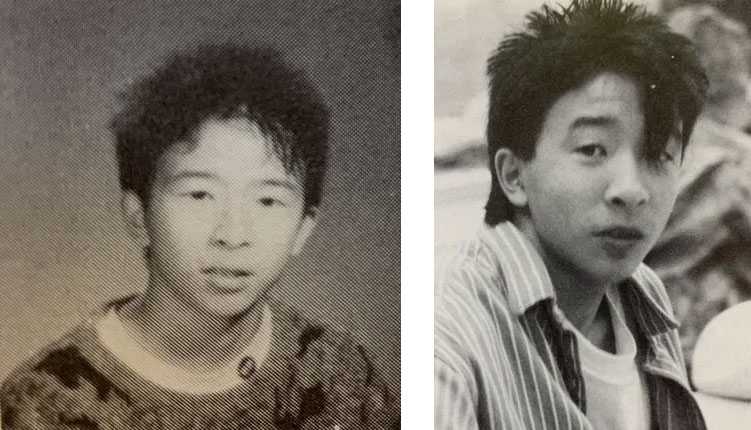
Yang himself majored in political science and economics at Brown before graduating from Columbia Law School in 1999. He then spent a miserable five months as a corporate attorney in New York, before quitting to launch a philanthropic fundraising start-up in 2000. This folded in 2002, whereupon the worked for a healthcare start-up before moving to test preparation company Manhattan Prep in 2005, becoming CEO a year later. The company’s acquisition by Kaplan in 2009 made him a millionaire.
Getting Noticed
This new-found financial freedom enabled Yang to devote more of his energy to the non-profit sector. In 2011 he founded Venture for America (VFA), which placed promising graduates with start-ups in cities across the US. The aim was to stem the flow of high-achieving graduates from college to the same set of corporate jobs in the major cities, thus putting their talents to use in developing parts of the country. By the time he left the organisation in 2017 its operating budget had grown from $200,000 to $6 million.
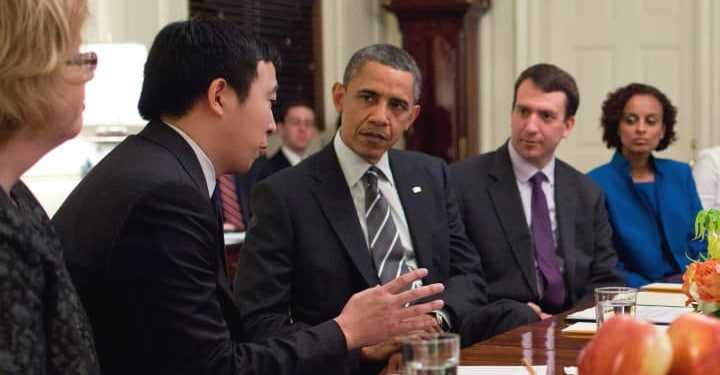
VFA’s success brought Yang to the attention of the Obama administration, who selected him for the Champions of Change program and later recognised him as a Presidential Ambassador for Global Entrepreneurship. His ideas were starting to gain traction and in 2014 he set them out in his first book, Smart People Should Build Things, which looked at the worrying trends in American work culture and proposed some solutions to them. Upon leaving VFA, he began to set his 2020 presidential campaign in motion.
Policies
The central plank of Yang’s manifesto for the presidency is his idea of a ‘Freedom Dividend’: a $1,000 monthly payment to every American over the age of 18, regardless of personal circumstances. This is intended as a response to the inroads made by technology into the labour market. This will, Yang argues, create ‘millions of jobs, making our families stronger and healthier; we’d save money on things like incarceration, homelessness services, emergency room healthcare…’
This Freedom Dividend is, of course, a form of Universal Basic Income (UBI), an idea which has been floating around for several years now. Many have long regarded it as a fantasy, yet the massive increase in state spending to combat the pandemic, both in the US and other countries, has seen it climb higher up the political agenda. While both costly and controversial, there is a growing sense that it may well be the sort of radical idea that is needed to revitalise stricken economies.
Yang’s campaign website lists over 160 other policies, including the legalisation of marijuana, a carbon tax and the banning of discrimination based on gender or sexual identity. His plans for a value-added tax on big tech corporations is also touted as a way to help finance the Freedom Dividend. Most interestingly for the crypto community however is Yang’s Crypto/Digital Asset Regulation and Consumer Protection policy.
Yang & Crypto
According to CoinDesk, ‘Andrew Yang has Big Crypto Energy.’ Of all the Democratic candidates, he is the only one with a clearly-defined policy o crypto and his outlook towards it appears to be positive. On his campaign website, he states that:
‘Investment in cryptocurrencies and digital assets has far outpaced our regulatory frameworks in the US. We should let investors, companies, and individuals know what the landscape and treatment will be moving forward to support innovation and development. The blockchain has vast potential.’
His promise to clarify current regulations, clearly define which regulatory bodies can police the space and provide greater protection for users all point towards someone who is ready to embrace crypto and its potential.
While this may not please everyone in the space, many of whom want to see less government interference, it should be music to the ears of those who believe it should play its part in the economy. As Yang himself has said, ‘my vision of the economy is very consistent with the people who are in the cryptocurrency community.’
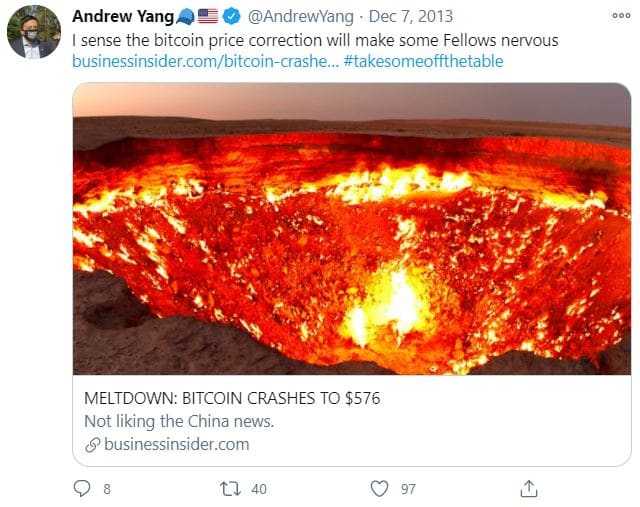
Yang’s campaign also accepted donations in crypto, which again points to a positive attitude towards digital assets. He has been aware of bitcoin since at least 2013, suggesting that he is not merely jumping on the crypto bandwagon.
The news that Yang has been appointed as an advisor to Joe Biden, albeit on small businesses and entrepreneurship, should give further cheer to the crypto community. The presence in the White House of someone who understands and is favourable towards crypto could help make the incoming administration that much more receptive to what it has to offer.
‘The Internet’s Favourite Candidate’
When Yang began his campaign in 2017, few gave him any chance of making an impact. He may have been a wealthy businessman and a respected figure, but he was hardly a famous name with millions to spend. And yet, his campaign picked up momentum, not least in early 2019 when he impressed Joe Rogan on an episode of the latter’s eponymous podcast.
His policies, as further outlined in his second book, The War on Normal People, started to gain traction and he attracted endorsements from figures such as Elon Musk, Jack Dorsey, Donald Glover and Dave Chappelle.
It’s telling to look at some of the comments on videos that feature his appearance at the DNC and on Tucker Carlson’s show. Many are from Republicans expressing their admiration, while others lament the lack of mainstream media coverage afforded to him.
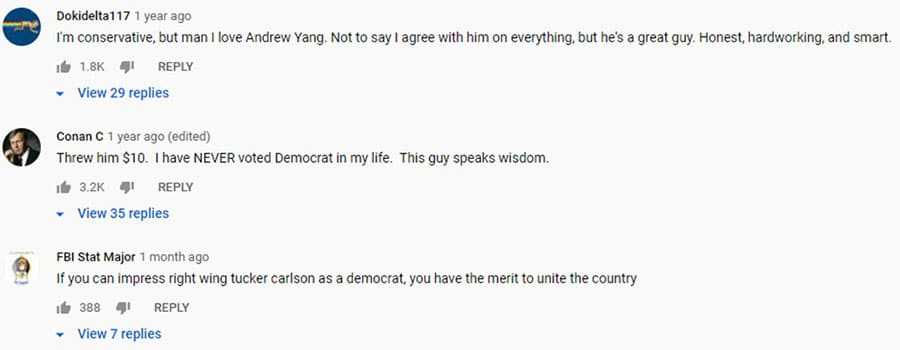
The Yang campaign made good use of the internet, not just to spread the word, but also to solicit vital donations. The New Yorker acknowledged this when it declared him ‘the internet’s favourite candidate’ and the donor profile makes for interesting reading.
Over the course of the whole campaign he attracted nearly 400,000 individual donors, 75% of whom gave $200 or less. This was by no means a conventionally-funded campaign, reliant on big donations from wealthy individuals and other self-interested quarters. Yang has a strong claim to be a man of the people when it comes to donations.
Not Left, Not Right, Forward
Yang has kept busy since his presidential campaign came to an end. His latest venture is Humanity Forward, another non-profit, which seeks to promote his political views, most notably on UBI. The organisation has been active in providing UBI-inspired pandemic relief to Americans impoverished by lockdown restrictions and push forward Yang’s dream of a ‘human-centred capitalism.’
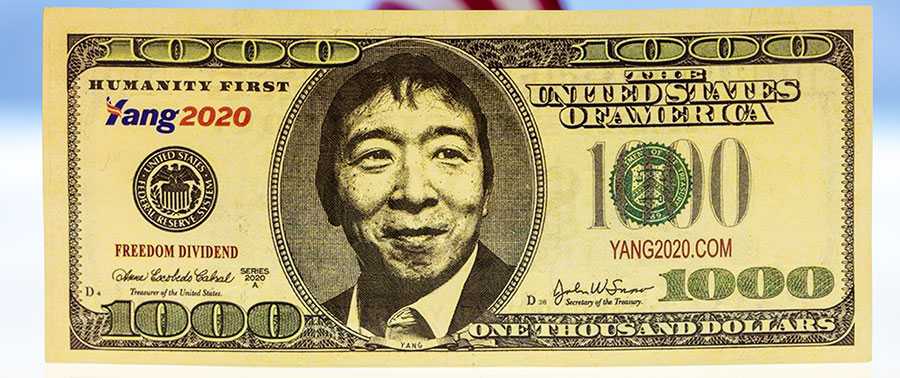
There is already speculation that, due to his age, Joe Biden may not seek a second term. Many are speculating that he will step aside in 2024 to allow Kamala Harris to run in his place. We cannot be sure on this point, though we can be fairly certain that a lot is going to happen between now and then. There has also been a lot of talk about who the Republicans may put up next, with many suspecting that Trump may have another shot in four years’ time.
It’s hard to make predictions at the best of times, let alone in times as turbulent as these. That said, Andrew Yang has achieved a lot, especially in the last few years, and is starting to look like a genuine contender for future high office. Could he get the vice-presidential nod from Kamala Harris in 2024? His championing of UBI and cryptocurrencies mark him out as a man of ideas and vision: two things we need a hell of a lot of right now. Watch this space.
Disclaimer: These are the writer’s opinions and should not be considered investment advice. Readers should do their own research.
